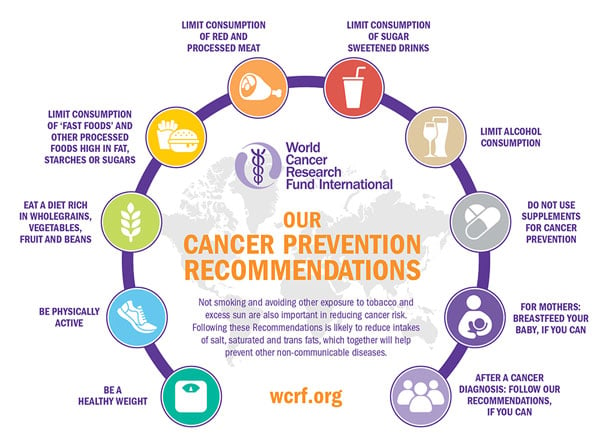 Marissa Shams-White is a Cancer Prevention Fellow at the National Cancer Institute in the US National Institutes of Health. Her research interests include examining dietary patterns and other modifiable lifestyle factors in relation to obesity and cancer prevention, as well as developing measurement tools to assess them.
Marissa Shams-White is a Cancer Prevention Fellow at the National Cancer Institute in the US National Institutes of Health. Her research interests include examining dietary patterns and other modifiable lifestyle factors in relation to obesity and cancer prevention, as well as developing measurement tools to assess them.
Given that an estimated 30–50 per cent of cancer cases may be preventable, one question that naturally comes to mind for many people is: “How can I lower my cancer risk?”
World Cancer Research Fund (WCRF) and American Institute for Cancer Research (AICR) are leaders in cancer prevention and recently published their evidence-based Third Expert Report, Diet, Nutrition, Physical Activity and Cancer: A Global Perspective. The report highlights ten key Cancer Prevention Recommendations for the public and policymakers on modifiable lifestyle behaviours, with an emphasis on eating a healthy diet, limiting alcohol consumption, maintaining a healthy body weight, doing regular physical activity, and, for mothers, breastfeeding. When followed together, these Recommendations promote a healthy lifestyle that reduces cancer risk, other non-communicable diseases (NCDs) and obesity.
While we can each focus on how to lower our own cancer risk, a researcher may take a broader public health focus and look at the same challenge from a different angle: “How can I study the impact of following these Recommendations on cancer risk among different populations?”
The 2018 WCRF/AICR Score
In order to address this question and compare results across many studies, a standard way of defining a score is needed to measure adherence to the Recommendations. A standardised scoring scheme to examine the impact of following WCRF/AICR’s Cancer Prevention Recommendations had not been developed previously. Consequently, many researchers established their own approaches, leading to high variability in scoring methods, limiting comparability of the studies’ findings.
I had the opportunity to collaborate with researchers at the US National Cancer Institute, WCRF, AICR and ISGlobal to develop a standardised framework to score adherence to WCRF/AICR’s Cancer Prevention Recommendations, to improve the ability to compare results between research studies. We developed this Score using a multistep process which incorporated feedback from the WCRF/AICR Continuous Update Project (CUP) Expert Panel.
The WCRF/AICR Score’s development is detailed in a paper in the journal Nutrients. The new Score:
- Includes up to seven points for an optimal score (or eight points if the optional breastfeeding component is included).
- Uses evidence-based cut points to operationalise specific goals under each Recommendation.
- Treats all included Recommendations equally (ie one is not given more weight over the others).
- Evaluates the amount of ultra-processed foods in the diet to address the new Cancer Prevention Recommendation to limit ‘fast foods’.
- Is adaptable to different measures of diet and physical activity.
- Is applicable across populations and countries.
- Is designed for population-based research, not as a diagnostic tool for an individual.
Future goals for the WCRF/AICR Score

We strongly encourage researchers to implement the Score to assess adherence to the Recommendations in their studies – whether population-based or clinical in nature – to give our community the opportunity to compare findings across different populations and countries.
We also encourage additional methodological work to examine the impact of other weighting schemes and potential Score modifications (eg using alternative, country-specific cut points or operationalising additional goals due to the availability of more detailed measures). These efforts should all be compared to the standardised Score as well.
It is our hope that researchers worldwide use this Score and publish their findings to promote an open, well-documented dialogue across global cancer prevention research efforts.
> Learn more about the Cancer Prevention Recommendations
> What’s the evidence that our Recommendations work?
> Read the published paper on the WCRF/AICR Score

